It is not recommended to put engine oil in a hot car as it can cause damage to the engine and lead to costly repairs. It is important to let the engine cool down before adding oil.
Following the manufacturer’s recommendations for oil changes is crucial. Extreme heat affects engine oil by depleting its additives sooner, altering the oil’s chemistry, and preventing it from lubricating, cooling, and protecting as designed. This can lead to the formation of deposits, sludge, and clogging of narrow oil passages, causing wear to vital components.
In this blog, we will explore the effects of adding oil to a hot engine, the optimum temperature for engine oil, and tips for checking and changing engine oil. We will also discuss the importance of following manufacturer’s recommendations for oil changes and the risks of not doing so.

Credit: m.youtube.com
Basics Of Engine Oil
Engine oil plays a crucial role in lubricating and protecting the internal components of a car’s engine. It helps in reducing friction and heat generation, thereby ensuring smooth operation and longevity of the engine. The viscosity of the oil is a key factor that determines its performance in different temperature conditions. Using the right viscosity oil for a specific temperature range is essential to maintain optimal engine protection. When it comes to adding oil to a hot car, it is generally acceptable to do so, but it is important to let the engine cool down slightly to avoid any potential risks. Always refer to the manufacturer’s recommendations for the correct oil type and viscosity for your specific vehicle.
Engine Heat Dynamics
When engines run, they generate heat due to friction and combustion. The optimum oil temperature for most engines is around 212°F. Higher temperatures can lead to oil breakdown and lower temperatures can cause poor lubrication. It is generally acceptable to add oil to a warm engine. However, adding cold oil to a very hot engine should be avoided as it can cause thermal shock and potentially lead to engine damage.
Risks Of Adding Oil To A Hot Engine
Adding engine oil to a hot car engine can pose risks, both in terms of potential injury and effects on engine performance. When the engine is hot, the oil can reach high temperatures, causing it to thin out and lose its viscosity. This can lead to poor lubrication, inadequate cooling, and reduced protection for vital engine components. Additionally, adding oil to a hot engine can result in splattering or spilling, which can cause burns or injuries.
It is generally recommended to let the engine cool down before adding oil. This allows the oil to settle and ensures a more accurate measurement of the oil level. Following the manufacturer’s recommendations for oil changes and maintenance is important to keep the engine running smoothly and to avoid costly repairs.
Benefits Of Warm Oil Changes
One of the benefits of performing warm oil changes is improved flow and drainage. When the engine is warm, the oil becomes less viscous, allowing it to flow more freely through the engine components. This improved flow helps to remove any contaminants or particles that may have accumulated in the oil, ensuring a cleaner and more efficient engine.
Easier removal of particles is another advantage of warm oil changes. As the oil is warmed up, it becomes thinner and less sticky, making it easier for the oil filter to capture and remove any particles or debris that may be present. This helps to prevent these particles from circulating through the engine and causing damage.
Overall, performing oil changes while the engine is warm can help to optimize the lubrication and performance of the engine, ensuring a longer and healthier lifespan for your vehicle.
Correct Procedure For Adding Oil
When it comes to adding engine oil to a hot car, it is not recommended to do so as it can cause damage to the engine and potentially lead to costly repairs. It is important to follow the correct procedure for adding oil, starting with checking the oil level. Always turn the engine off and level the vehicle before checking the oil level. If the oil level is below the minimum mark on the dipstick, then add oil to bring it up to the maximum mark. However, it is important to note that you should never overfill the engine with oil. Additionally, always be vigilant of the oil mark on the dipstick and check it regularly to ensure that the engine is properly lubricated.

Credit: www.paulsautorepair.com
Myths And Misunderstandings
Adding engine oil to a hot car is not recommended as it can cause damage to the engine and potentially lead to costly repairs. It is important to follow the manufacturer’s recommendations for oil changes and to let the engine cool down before adding oil.
In the world of car maintenance, there are many myths and misunderstandings surrounding the use of engine oil. One common question is whether it’s safe to put cold oil in a hot engine. While it may seem like a quick fix, adding cold oil to a hot engine can actually cause damage to your car’s engine. This is because the sudden change in temperature can cause the oil to break down and lose its lubricating properties, which can lead to engine wear and tear. It’s important to follow the manufacturer’s recommendations for oil changes and to let the engine cool down before adding oil. Additionally, it’s important to keep an eye on the oil level and viscosity to ensure your car’s engine is properly lubricated and running smoothly.Practical Tips For Car Owners
When it comes to car maintenance, checking oil levels regularly is crucial for optimal performance. It is important to prevent any potential damage by ensuring that you check the oil when the engine is cold. Adding engine oil to a hot car can cause harm to the engine and may lead to costly repairs. To avoid this, always allow the engine to cool down before adding oil.
Additionally, following the manufacturer’s recommendations for oil changes is essential. Regular maintenance and preventive measures can help prolong the life of your car’s engine. Keeping an eye on the oil level and ensuring it is within the recommended range is a simple yet effective way to maintain your vehicle’s performance and prevent any potential issues.
In conclusion, it is not recommended to put engine oil in a hot car. Always check oil levels when the engine is cold and follow the manufacturer’s guidelines for oil changes. By taking these preventive measures and practicing regular maintenance, you can ensure your car runs smoothly and avoid unnecessary expenses.

Credit: medium.com
Frequently Asked Questions
Is It Ok To Put Oil In A Hot Car?
Yes, it’s okay to put oil in a hot car engine. Adding cold oil to a hot engine won’t cause damage.
Do I Need To Let The Engine Cool Before Adding Oil?
It’s not necessary to let the engine cool before adding oil. You can add oil to a warm engine without causing any harm.
How Hot Is Too Hot For Engine Oil?
It is not recommended to put oil in a hot car engine. Adding cold oil to a hot engine can cause damage and potentially lead to costly repairs. It’s best to follow the manufacturer’s recommendations for oil changes and allow the engine to cool down before adding oil.
What Happens If Oil Gets Too Hot In Car?
Adding cold oil to a hot car can lead to sludge and deposits, causing wear and damage to the engine. It’s important to let the engine cool before adding oil to prevent costly repairs.
Conclusion
Adding engine oil to a hot car engine is generally acceptable and won’t cause harm. However, it’s important to follow the manufacturer’s recommendations and let the engine cool down before adding oil. It’s also crucial to monitor the oil level and viscosity to ensure optimal engine performance and longevity.
